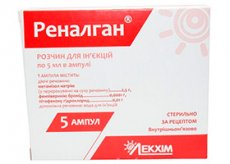Medical expert of the article
New publications
Preparations
Renalgan
Last reviewed: 03.07.2025

All iLive content is medically reviewed or fact checked to ensure as much factual accuracy as possible.
We have strict sourcing guidelines and only link to reputable media sites, academic research institutions and, whenever possible, medically peer reviewed studies. Note that the numbers in parentheses ([1], [2], etc.) are clickable links to these studies.
If you feel that any of our content is inaccurate, out-of-date, or otherwise questionable, please select it and press Ctrl + Enter.

Renalgan has intense antispasmodic, analgesic, and also weak anti-inflammatory therapeutic properties.
The drug is a complex agent whose activity develops under the medicinal influence of its constituent components - pitofenone with sodium metamizole, and also fenpiverinium. It helps to eliminate severe pain or severe spasms that occur in various diseases affecting different organs and systems of the human body.
Indications Renalgana
It is used in the following situations:
- pain of varying intensity and degree;
- spasms of the muscles of the internal organs (biliary, renal and intestinal colic, as well as spasms affecting the ureter and bladder), as well as algomenorrhea.
It is prescribed for the treatment of symptoms of such pathologies: neuralgia, arthralgia and sciatica, and in addition myalgia. At the same time, it helps to eliminate pain that appears after operations.
Release form
The element is released in tablets - 10 pieces per plate.
In addition, it is sold as a liquid for intramuscular and intravenous injections - inside 5 ml ampoules; there are 5 ampoules in a box.
Pharmacokinetics
The drug is absorbed at high speed after intramuscular injection. Bioavailability values are approximately 85%. Blood Cmax is observed on average after 60 minutes.
Metamizole is synthesized with blood protein by 50-60%, and in addition, it easily passes through the BBB and placenta. The drug undergoes intensive intrahepatic biotransformation; metabolic elements of the drug have medicinal activity.
Excretion occurs mainly through the kidneys – in the form of metabolic components.
Dosing and administration
The drug solution must be administered intramuscularly in portions of 2-5 ml of the substance. The procedure should be repeated at 7-8 hour intervals. A maximum of 10 ml of the drug can be used per day. Such administration should continue for 2-3 days, and then the patient is transferred to Renalgan tablets.
Teenagers over 12 years of age and adults should take 1-2 tablets of the drug per 1 application. It is recommended to use the drug after meals. A maximum of 3 servings of the substance are consumed per day. The intake should be repeated at 6-8 hour intervals. A maximum of 6 tablets are allowed per day. It is recommended to prescribe tablets after a course of injections of the drug.
Use Renalgana during pregnancy
Renalgan should not be prescribed during breastfeeding or pregnancy.
Contraindications
Main contraindications:
- severe intolerance to the drug;
- blood pathologies;
- CHF or coronary heart disease, and also tachycardia;
- diseases affecting the kidneys or liver;
- closed-angle glaucoma;
- prostate adenoma.
Caution in use is required in the following situations:
- BA;
- liver or kidney failure;
- decreased blood pressure values;
- severe sensitivity to NSAID substances or urticaria caused by the use of aspirin or other NSAIDs.
Side effects Renalgana
When using the recommended doses, the medication is often tolerated without complications. Occasionally, local signs of allergy (rashes or itching), burning in the stomach area, dry mouth, dizziness, decreased blood pressure, headaches, tachycardia and hypohidrosis may be observed.
Long-term use or use of large doses may cause thrombocytopenia or leukopenia and agranulocytosis, which manifest as fever, chills, stomatitis and sore throat.
Overdose
In case of intoxication, the following symptoms are observed: symptoms of a toxic-allergic nature, gastrointestinal disorders, signs of damage to the hematopoietic organs and brain (in the form of dry mouth mucous membranes, nausea and stomach pain), and in addition to this, a decrease in blood pressure, drowsiness, convulsions, accommodation disorder, confusion and problems with renal function.
Interactions with other drugs
The use of the drug together with substances that depress the central nervous system, as well as with alcoholic beverages, can lead to a disorder of the patient's psychomotor activity (drowsiness appears).
The combination of the drug and non-narcotic analgesics mutually potentiates their toxic properties.
The combination of Renalgan with chlorpromazine leads to the development of severe hyperthermia.
Penicillin, as well as radiocontrast agents with colloidal blood substitutes, cannot be used during therapy with drugs.
Tranquilizers and sedatives potentiate the analgesic effect of the drug.
The toxic activity of the drug increases when used together with oral contraception and antidepressants.
The therapeutic effect of reganol is weakened when combined with phenylbutazone.
Shelf life
Application for children
Not for use by children under 5 years of age.
Analogues
Analogues of the drug are Maxigan, Spazmadol, Baalgin with Realgin, and also Baralgetas, Spazmoblok, Baralginus and Reonalgon with Trinalgin. In addition, the list includes Spazmalgon with Spazgan, etc.
Reviews
Renalgan mostly receives positive reviews on forums. The drug is noted for its high therapeutic effectiveness (especially for renal or intestinal colic, headaches or toothaches, and also after surgeries).
Attention!
To simplify the perception of information, this instruction for use of the drug "Renalgan" translated and presented in a special form on the basis of the official instructions for medical use of the drug. Before use read the annotation that came directly to medicines.
Description provided for informational purposes and is not a guide to self-healing. The need for this drug, the purpose of the treatment regimen, methods and dose of the drug is determined solely by the attending physician. Self-medication is dangerous for your health.


 [
[